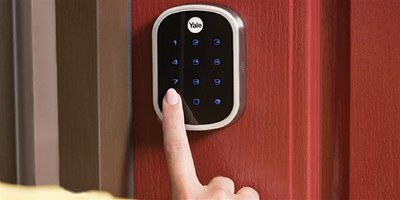When we provide security audits for our residential customers, we often begin with some ideas to increase door security. Of course, doors provide the easiest and quickest means of entry into any home. This goes for residents, guests, and — unfortunately — for burglars as well. Therefore, we recommend taking extra care to make sure your doors keep unwanted visitors away. In this post, we share some of our top tips for creating residential door security.
First, we’ll share some tips for choosing the right locks. Additionally, we’ll show you a couple of little-known devices that we install to beef up your door’s security. From there, we’ll look at how keypad locks can provide a unique measure of security and key control. Last but certainly not least, we’ll also share how we use door security contacts to help keep burglars at bay. Now, let’s get started and see how we help customers choose the right hardware for their doors!
Choosing the Right Lock Hardware
As we pointed out earlier, you should consider door security at or near the very top of your own security priority checklist. Unfortunately, many homeowners fail to properly address this area effectively. Customers often buy homes with old locks that never get replaced or repaired. Furthermore, most locks that we find on houses provide very little actual security. Finally, homeowners often fail to take advantage of available lock hardware that can provide added security. In this section, we’ll look at how you can conquer these potential dangers. Let’s start by exploring why so many homeowners have ineffective locks, as well as a solution to this issue.

It surprises many customers to learn that locks are “graded” to show customers their strength and durability.
Finding High-Quality Locks that Work for You
Most homeowners believe that just about any locks they buy from the hardware store will work just fine for them. However, lock quality varies more than most people realize. In fact, lock hardware quality varies so much that the industry uses a three-point grading system designed by the American National Standards Institute (ANSI) and Builders Hardware Manufacturers Association (BHMA) to measure a lock’s quality!
Lock manufacturers often seek out ANSI/BHMA certification for their product lines. This rating system involves putting locks through tests that gauge factors such as bolt strength, security, the ability to withstand impact and force, and quality of finish, among others. Allegion, one of the biggest global providers of security products, provides this helpful guide to door hardware testing. The lowest-quality hardware receives a “Grade 3” designation, with the best scoring in at Grade 1. As you can probably guess, Grade 2 falls right in the middle. Grade 2 locks represent a step up from Grade 3, without having quite the quality of a Grade 1 lock.
Unfortunately, most locks found in hardware stores for bargain prices fall under “Grade 3” quality standards. Burglars can easily pick these locks, or drill them to gain access to your property. With locks as much as with many other products, you often get exactly what you pay for. Before purchasing locks, look at the packaging to see if you can determine what grade of lock you are buying. If you cannot find this information, assume that you are holding a Grade 3 lock. While installing these locks still beats installing no locks at all, we do not recommend using them. Instead, look into installing a lock that will last longer while providing more dependable performance. Now, let’s move on and consider some additional lock equipment that improves residential door security.
Additional Door Hardware for Extra Security
Most homeowners install doorknobs and deadbolts and call it a day. However, doing so can leave you vulnerable to several common burglary tactics. For example, burglars can sometimes break windows on doors and reach inside to unlock deadbolts and doorknobs. Some customers install double-sided deadbolts that require a key to operate either side to combat this danger. Unfortunately, doing so can create a fire escape hazard. Residents of a home should never have to search for a key to escape a burning home. Therefore we recommend adding other lock hardware to help reinforce these doors.
For example, installing turn bolts that burglars cannot reach through the window can provide this added security. These locks add the strength of an extra deadbolt without the need for a key. We also offer devices to reinforce the hinge side of doors. Burglars often kick through doors on the hinge side rather than attempt to compromise the door’s locks. Installing hardware to defend against this type of attack can add security to your doors. Now that we’ve given a look at effective selection of mechanical locking hardware, let’s see how installing electronic keypad locks can make your door security more effective.
Adding Key Control with Keypad Locks
Keypad locks provide residential door security in a couple extremely instrumental ways. For starters, they help with key control. The keypads on these locks grants access to your property’s doors through unique user codes. Therefore, you do not need to worry about tracking how many keys you’ve given out and who may have copies. Simply create new codes for individuals as needed, and delete these codes as you wish to limit access. This allows you to keep past contractors or house sitters out of your home after you no longer want them there.

Smart keypad locks, such as this model by Yale, allow you to use codes or a mobile device to operate your home’s locks.
Additionally, installing a keypad smart lock creates to an even greater level of security. Customers can add and delete user codes remotely using a smartphone app or even a computer. Even more impressively, you can also lock and unlock your door remotely using a smartphone app as well! This allows you to give one-time access whenever needed without providing a key or a code. The unique features provided by these locks make them one of our most popular and effective forms of security. Now, let’s turn our attention to how we use alarm contacts to create added door security.
Securing Your Doors with Alarm Contacts
Installing alarm contacts on doors can provide a couple different types of security. Standalone door sensors have sounders built in and create a blaring siren response to detecting an open door. Furthermore, we can install door contacts as part of a complete burglar alarm system for greater security. In these instances, a door breach will still create a siren response, this time from the centrally-located siren we install as part of your alarm.
Additionally, we also generally create a connection between customers’ alarm systems and our central station. Upon receiving an alarm report, our central station will reach out to you directly. If needed, they will also dispatch the authorities in response to your emergency. The combination of a screaming siren and a police dispatch generally send burglars running immediately! For this reason, door contacts installed as part of a security system have long remained on of the most effective forms of home security available.
Putting it All Together for Complete Residential Door Security
We hope that this post helps you achieve effective residential door security in your own home. Moreover, we encourage you to contact us with any questions you may have about the material presented here. We will happily offer any information we can to help you in this important area. Furthermore, we encourage you to take advantage of our free site survey program. We offer complimentary security audits and equipment quotes to both new and existing customers alike.
Perhaps you have some good door security in place, but wish to take it to the next level by incorporating some of the tips found here. Or, maybe you have only minimal security now, and wish to get your security plan started off on the right foot. Either way, we are here to help. While on site, we can address any security concerns you may have. Additionally, we can make suggestions based on our own observations made during our visit. Together, we can create a complete door security plan to keep you and your family as safe and secure as possible!
